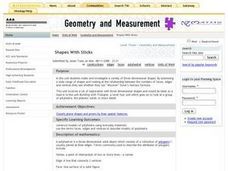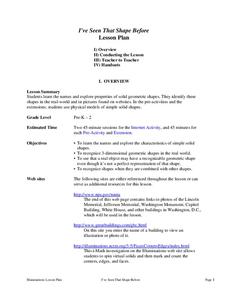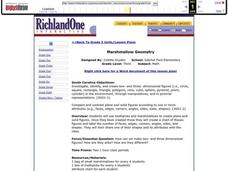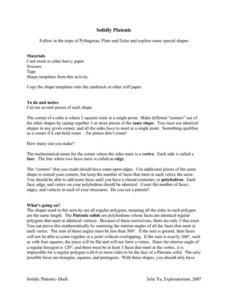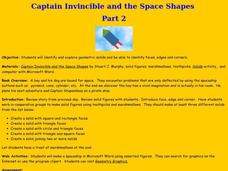Curated OER
Identifying Faces, Edges, and Vertices
Fourth graders examine faces, edges, and vertices. In this geometry lesson, 4th graders participate in classroom activities that require them to compare geometric shapes, figures, and models.
Curated OER
3D Shape Properties: Faces, Edges, Corners
In this math learning exercise, students describe the properties of various 3D shapes. Students tell about faces, edges and corners and name the geometric figures.
Exploratorium
Corner Reflector
If you set up a triad of mirrors into a corner figuration, they act as a kaleidoscope, bouncing light waves back and forth indefinitely, changing the light that your eyes perceive. Although the materials required are very specific and...
PBS
Four Corners
It's imperative to be as precise as possible. Future engineers learn about precision by building a cardboard machine. The base, corners, handles, and paddles must all be assembled with precision or the machine won't work.
Curated OER
Shapes with Sticks
Third graders investigate three dimensional shapes. They examine a variety of shapes and the relationship between the number of faces, edges, and vertices. Students determine Euler's formula and they create a variety of three dimensional...
Curated OER
2D Polygons and 3D Nets
Students compare and contrast two dimensional polygons and three dimentional nets by examining the differences in drawings. They create three dimensional shapes and label the faces, edges, and vertices. After creating the shapes, they...
Curated OER
Countdown Challenge: Platonic Solids - Part I
Use a Platonic solids learning exercise to record the number of faces, edges, and vertices of five polyhedra whose faces, edges, and vertices are all identical. For each figure, learners write a proof of Euler's formula (F+V=E+2). They...
Curated OER
Attributes of Solid Shapes- First Grade Reteaching Worksheet
In this attribute of solid shapes reteaching worksheet, 1st graders review the meaning of faces, corners, curves, and edges. They complete 8 examples by circling the curves, faces, edges, and corners on the given shapes.
World Wildlife Fund
Arctic Shapes
In a two-part activity, young geometers examine 3-D shapes and describe their attributes in a table. They will be able to draw the shape and name the number of vertices, faces, and edges. In the second part, individuals explore nets...
Fayetteville Public Schools
I've Seen That Shape Before
The objectives in the resource allow students to explore the characteristics of simple solid shapes. Youngsters learn to recognize the face shapes, corners, and edges that make up 3-D figures by filling in a chart. Lastly,...
Houghton Mifflin Harcourt
Unit 3 Math Vocabulary Cards (Grade 1)
Reinforce math vocabulary with a set of flashcards. Each card showcases a boldly typed word or a picture representation with labels. The topics are geometry related and include terms such as cones, faces, pyramids, sides, and...
Curated OER
When Art's a Craft
What would it be like to restore modern works of art? By acting as modern art conservators, learners assess the first-hand difficulties faced in restoration efforts. In addition, they create modern art pieces from random materials. Then,...
Curated OER
Marshmallow Geometry
Third graders create 2D and 3D shapes using marshmallows and toothpicks. In this geometry activity, 3rd graders create their shapes and document the number of faces, edges, corners, angles, and sides. They share one shape and its...
Curated OER
Solidly Platonic
When they do, they learn. Using this resource, young mathematicians learn about platonic solids by actually building, touching, and examining the shapes. They connect their observations about the shapes to Euler's formula.
Curated OER
Three Dimensional Figures
In this geometry worksheet, students study diagrams with labels of common geometric figures. Students then answer 24 questions. Then they draw and label their own figures.
Curated OER
Cube Coloring Problem
Upper elementary and middle schoolers describe the various features of unit cubes, such as edges, corners, and faces. They also discuss how to represent measurements of a cube using exponents before engaging in various thinking and...
Curated OER
I've Seen That Shape Before
Students identify geometric solids. In this shape instructional activity, students explore the characteristics of geometric solids. They locate pictures of shapes on the internet, and identify the shapes. Students draw...
Curated OER
Animal Morphs
Students explore animal drawing. In this cross curriculum drawing, photography, and animals lesson, students combine computer drawing and freehand drawing to create an animal and its environment using a photograph of their...
Curated OER
Yummy Shapes
Students explore space shapes learning about edges, corners, and faces. They enjoy shape soup as a culminating activity.
Curated OER
Color Me Square
Second graders identify and describe basic geometric solids. Working as a class, 2nd graders describe geometric solids using the proper vocabulary and counting faces, bases, corners, and edges. In pairs, students use a computer drawing...
Curated OER
Spacemobiles
Aspiring astronauts construct a space vehicle using cylinders, cones, spheres, and rectangular prisms. This is an engaging method of learning about three-dimensional shapes. Note that the word cylinder is constantly misspelled in the...
Curated OER
Captain Invincible and the Space Shapes
Students recognize the features of geometric shapes. In this geometric shapes instructional activity, students listen to Captain Invincible and the Space Shapes. Students create solid figures with marshmallows and toothpicks. ...
Curated OER
It's a 3-D World Out There!
Students construct polygons. They identify attributes of three-dimensional shapes. Students name common three-dimensional shapes. They draw three-dimensional shapes, and sort three-dimensional shapes. Students use K'NEX materials sets to...
Mathematics Vision Project
Module 5: Modeling with Geometry
Solids come in many shapes and sizes. Using geometry, scholars create two-dimensional cross-sections of various three-dimensional objects. They develop the lesson further by finding the volume of solids. The module then shifts...






